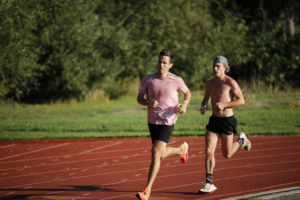Is Heart Rate helping or hurting your training?
I’ve been running and coaching runners for a very long time, and probably the thing that has confused me the most is the emphasis on heart rate. I have a million thoughts, but I really just want to ask two questions:
- Why are you so sure that this specific heart rate, in these conditions, has significant physiological meaning?
- Where and how did you come up with those specific benchmarks?
Newer runners often say things like:
- “Oh, at 140 bpm, THIS happens to my body.”
- “Well, I saw this number in the workout/race, so I hit the brakes and slowed WAY down!”
(I mean this with all the love in my heart and with the sole intention of helping you become faster—I love you.)
But here’s the thing: I’ve been around hundreds of professional and elite runners, and I don’t know if I’ve ever heard one of them say anything remotely like that. The faster a runner is, the more they seem to ignore heart rate and just understand how fickle it is. Heat, sleep, alcohol, stress, caffeine, chronic training load—heart rate is influenced by all of these and then some.
One of the things that really scares me as a coach is when runners obsess over these numbers. Mainly because I’ve seen so many fast runners compete at heart rates I would’ve guessed were unsustainable for long periods. Eventually, I just stopped bumping up against that glass ceiling—it wasn’t useful or reliable.
Here’s the thing:
We need to feel and know how and when to slow down so we don’t blow up. Heart rate can be one metric to help us with that, but there are so many other, better ways to do it. As we run, there are hundreds of sensations happening throughout the body. You can feel fatigue in different leg muscles. You can hear your breathing—sometimes it’s practically screaming at you. Heck, there’s just a general sense of unease when you’re running too fast. These cues are all helpful, trainable, and ready to use.
Now, here’s the irony:
One of the only meaningful ways I use heart rate is to help define easy running—Zone 2 stuff. And that’s great! But let’s not forget, most racing happens outside of Zone 2. That’s why we train: to get faster and more competitive. Using heart rate to clearly define higher zones? It’s tricky, time-consuming, and honestly not worth it for how often it leads us astray from our goals. It’s a ton of work for something that often feels like it’s reading the wrong map.
And now, with all due respect to my promise of asking only two questions, here’s a few more:
- What if you’re wrong about your heart rate zone?
- What if your wrist-based heart rate monitor is about as accurate as a drunk fortune teller?
- What if your personal heart rate zones don’t match the generalized data used to define them?
One thing I learned a long time ago is that races aren’t won by the runner with the most efficient heart beat. They’re won by the runner who crosses the finish line first. While heart rate can offer some useful clues, it’s rarely the compass I’d use to navigate this running journey. The real magic happens when you stop being a slave to the numbers and start learning to feel your effort.
I’ve been running and coaching runners for a very long time and probably the thing that has confused me the most is the emphasis on heart rate. I have a million thoughts, but I really just want to ask two questions.
Newer runners hear many things about zone 2, and specific beats per minute. It’s INCREDIBLY common for a novice runner to say something like, “oh at 140 bpm THIS happens to my body.”
or
”Well I saw this number in the workout/race so I hit the brakes and slowed WAY down!”
One of the things that really scares me as a coach is when runners say that. Mainly because I have watched so many fast runners compete at heart rates higher than I would have guessed they could sustain for long periods. So eventually I just stopped bumping up against that glass ceiling.
We need to feel and know how and when to slow down while running so we don’t blow up. Heart rate can be a metric to help us with that BUT there are so many other and better ways to do this. As we run there are hundreds of sensations going on throughout the body. We can feel fatigue in each of our leg muscles. We can feel and sometimes even hear our breathing! Heck there’s just a general uncomfortability and uneasiness when we’re running too fast. These are all helpful and trainable and usable.
(I mean that next part with all the love in my heart with the sole intention of providing knowledge to runners to help them become faster; I love you)
My questions are: Why are you sure that this specific heart rate, in these conditions, has significant physiological meaning?
2nd Question: Where and how did you come up with those specific benchmarks?
I’ve been around hundreds of professional and elite runners and I don’t know if I’ve ever heard someone say that. The faster a runner is it seems like they ignore heart rate and understand how fickle it can be. It’s easily impacted by heat, sleep, alcohol consumption, stress, chronic training load, etc etc etc.
At the risk of saying I was going to only ask two questions, and now asking more; What if you’re wrong? What if that isn’t your zone and you’re just randomly braking earlier than you need? What if your wrist based heart rate monitor isn’t very accurate? What if you have unusual heart rate zones compared to the general population?
A lesson I learned a long time ago is that the race happens outside of all of these metrics. The runner with the most efficient heart beat doesn’t win, it’s who gets across the line first. And while heart rate can often give us clues and signs, it’s very rarely the compass I would choose to navigate us on this journey
Another really interesting point, one of the only meaningful ways i use heart rate is to define easy running like zone 2. Ironically though for almost everyone, most of racing, which is why we are training, happens outside of zone 2. Using heart rate to clearly define higher zones is so so tricky and I don’t find it very useful for how much work it is and how often it leads us astray from our goals.



